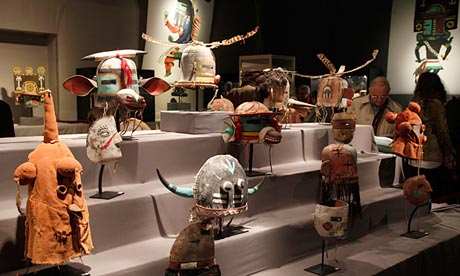By THOMAS ADAMSON Associated Press
The Native American Hopi tribe took a Paris auction house to court Tuesday to try to block the upcoming sale of 32 sacred tribal masks, arguing they are “bitterly opposed” to the use as merchandise of sacred objects that represent their ancestral spirits.
The Katsinam masks are scheduled for sale at the Drouot auction house on Dec. 9 and 11, alongside an altar from the Zuni tribe that used to belong to late Hollywood star Vincent Price, and other Native American frescoes and dolls.
Advocates for the Hopis argue that selling the sacred Katsinam masks as commercial art is illegal because the masks are like tombs and represent their ancestors’ spirits. The tribe nurtures and feed the masks as if they are the living dead. The objects are surreal faces made from wood, leather, horse hair and feathers and painted in vivid pigments of red, blue, yellow and orange.
In April, a Paris court ruled that such sales are legal in France, and Drouot sold off around 70 Hopi masks despite vocal protests and criticism from actor Robert Redford and the U.S. government. The U.S., unlike France, possesses laws which robustly protect indigenous peoples.
Tribal lawyers filed a new lawsuit over the new sale, and a Paris court held a hearing in the case Tuesday. The judge will issue a verdict Friday, three days before the first sale.
The Hopis’ French lawyer, Pierre Servan-Schreiber, remains optimistic that this time the judge will rule in their favor. His argument highlights an existing French law which prevents the sale of tombs, and gives these objects a special, protected status.
“The Hopis are saying that not everything can be sold and bought. The day that there are no more Katsinam masks, the Hopi tribe will exist no more,” Servan-Schreiber argued in court.
“It’s a cause worth fighting for. And like all good causes, you need to keep fighting. The Hopis have been massacred, slaughtered, pillaged and for years deprived of what was theirs, and at some point this has to change,” Servan-Schreiber said.
The tribe has said it believes the masks, which date back to the late 19th and early 20th century, were taken from a northern Arizona reservation in the early 20th century. Curiosity about one of the oldest indigenous tribes whose territory is now surrounded by the U.S. state first led collectors and researchers there.
“The Katsinam (masks) represent cultural heritage, objects of tribal and ceremonial rites. It’s the Hopis’ collective property — they have never belonged to anyone, have no commercial value,” said Leigh Kuwanwisiwma, director of the Hopi Cultural Preservation Office, in a statement.
Drouot auction house disagrees.
“These are extremely beautiful artifacts. They belong to a private collector and have not been stolen. The fact this collector wishes to sell them here in Paris shows that the city is seen as the world leader in the sale of primitive art,” Eric Geneste of the Drouot auction house said, recalling that in the April sale, the 70 masks sold for some $1.2 million.
The lawyer for Eve auction house that’s selling the masks, Corinne Matouk, compared the objects to sacred Qurans or Bibles that have been sold legally.
“Sacred objects from the big monotheistic religions have been sold at auction in the same way. In no way do I question the value they have for the Hopi tribe. This is about the law … Why are we giving them a special status?” asked Matouk.
In addition to the 32 Hopi masks, Drouot will sell a Zuni altar taken from a private temple from the New Mexico-based tribal community, as well as three two-meter (6 ½ -foot) Native American frescoes. The only other existing frescoes of this type are exhibited in New York’s Museum of Modern Art.
It is unclear if the Zunis altar is also considered too sacred to sell, and the tribe wasn’t available for comment.
Monroe Warshaw, an art collector from New York, who bought two Hopi masks for around 28,000 euros ($36,500) in April, first said in an interview with The Associated Press that he didn’t believe the masks had been stolen from the Hopis and had refused to return them.
“How did they steal them? Did some antique dealer go into their house at night and steal them?”
But subsequently Warshaw had a change of heart. He visited the Hopi community after his comments created a backlash and he reportedly received hate mail. He returned the masks to the tribe in September, saying that his visit made him see that the masks did indeed have a special meaning for the tribespeople.
The Associated Press is not transmitting images of the objects because the Hopi have long kept the items out of public view and consider it sacrilegious for any images of the objects to appear.
———
Thomas Adamson can be followed at https://twitter.com/ThomasAdamsonAP
 These Hopi masks were auctioned on Monday
These Hopi masks were auctioned on Monday





